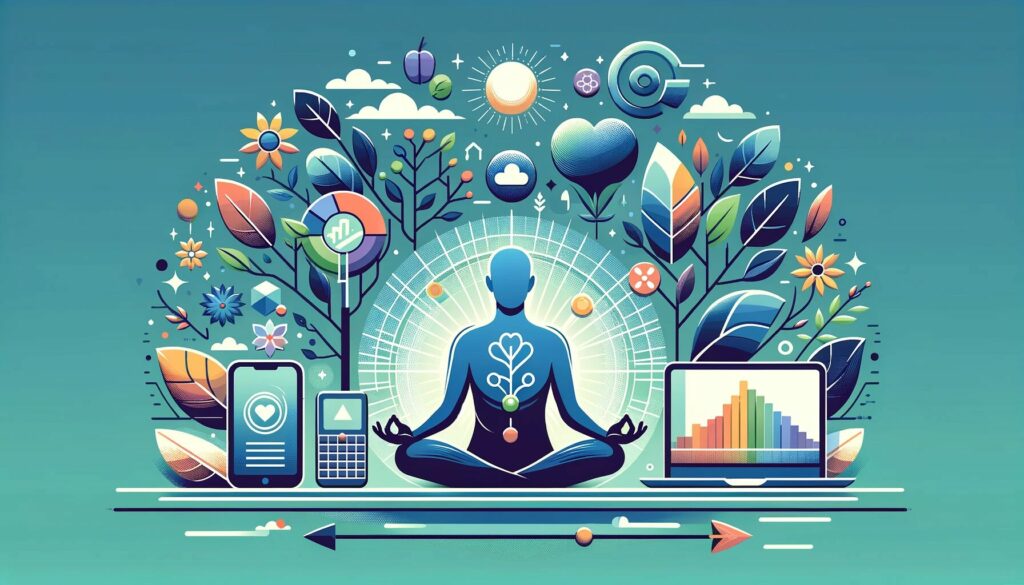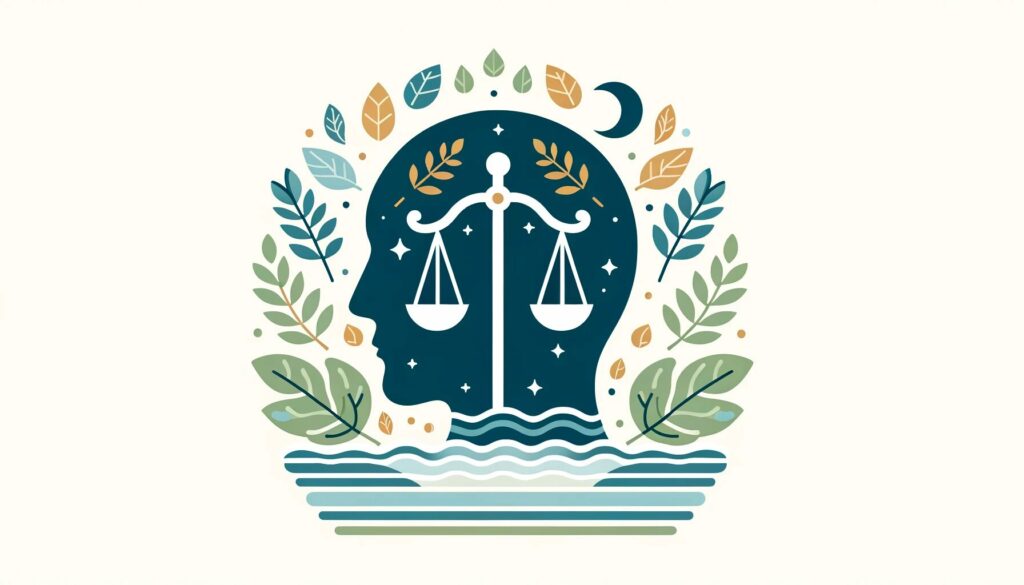Introduction
In an era where the pace of life seems only to accelerate, the importance of mental health has never been more pronounced. The constant bombardment of information, the relentless demands of work, and the intricate challenges of personal life can leave even the most resilient individuals feeling the strain. In this context, the practice of mindfulness emerges not just as a remedy but as a sanctuary—a means to navigate the tumult of daily life with grace, balance, and a sense of inner peace.
Mindfulness, a simple concept rooted in ancient wisdom, has found its place in the modern world as an antidote to the chaos. It is the art of being present, fully engaged with whatever we are doing in the moment, free from distraction or judgment, with a soft and open mind. Embracing mindfulness means opening the door to a multitude of benefits, not just for our mental health but for our overall well-being.
As we delve into the essence of mindfulness and explore its profound impact on mental health, let’s embark on a journey to understand how this gentle practice can nurture our minds, enrich our lives, and illuminate the path to mental clarity and emotional balance.

Understanding Mindfulness
In the midst of our fast-paced, technology-driven lives, mindfulness stands as a beacon of tranquility, inviting us to slow down and reconnect with the essence of our being. But what exactly is mindfulness, and why has it become such a pivotal practice in the realm of mental health?
At its core, mindfulness is the practice of being fully present and engaged in the moment, aware of our thoughts and feelings without distraction or judgment. It’s about experiencing life as it unfolds, with a gentle acceptance of whatever arises, be it pleasant or challenging. This simple yet profound state of awareness opens the door to numerous benefits that touch every facet of our lives.
The Benefits of Mindfulness for Mental Health
- Stress Reduction: Regular mindfulness practice creates a buffer against the pressures of life, helping to reduce stress and foster a sense of inner peace.
- Emotional Balance: Mindfulness helps us navigate our emotions with greater ease, providing the tools to experience our feelings without being overwhelmed by them.
- Improved Sleep: By quieting the mind and soothing the nervous system, mindfulness can significantly enhance the quality of our sleep, which is crucial for mental and physical health.
- Enhanced Focus: In a world rife with distractions, mindfulness offers a way to sharpen our concentration and improve our ability to stay present and engaged.
But mindfulness is more than just a personal practice; it’s a journey of self-discovery and growth. It teaches us to observe our thoughts and feelings without attachment, offering a pathway to deeper understanding and compassion for ourselves and others. As we cultivate mindfulness in our daily lives, we begin to notice shifts—small at first, but deeply transformative over time. We find clarity amid confusion, calmness in the face of chaos, and resilience in moments of challenge.
In the next section, we’ll explore how mindfulness specifically contributes to mental health, unraveling the science behind its healing power and the ways it reshapes our relationship with our minds.

The Role of Mindfulness in Mental Health
The intertwining of mindfulness and mental health is profound and transformative. As we delve deeper into this relationship, we uncover the myriad ways in which mindfulness acts not just as a practice, but as a powerful tool for healing, understanding, and growth.
Reducing Anxiety and Depression Mindfulness introduces a space between our thoughts and our reactions, providing a unique vantage point from which to observe our mental patterns without being ensnared by them. Studies have shown that mindfulness-based therapies are effective in reducing symptoms of anxiety and depression, offering solace and clarity to those who practice it. Source: Mindfulness Works Australia. (2024)
Enhancing Relationships Mindfulness extends its benefits beyond the individual, touching the lives of those around us. By fostering presence and awareness, mindfulness enhances communication and understanding in relationships, leading to increased empathy, compassion, and connection. Source: Mindfulness Works Australia. (2024)
Improving Sleep and Self-Acceptance A tranquil mind fosters tranquil sleep. Mindfulness practices have been shown to improve sleep quality, aiding in the rejuvenation of both mind and body. Moreover, the practice of mindfulness nurtures a climate of self-compassion and acceptance, encouraging individuals to embrace their imperfections and extend kindness to themselves.Source: Mindfulness Works Australia. (2024)
Boosting Concentration and Creating Healthy Habits In an age of constant distraction, mindfulness stands as a pillar of focus and clarity. It aids in honing concentration, enhancing productivity, and nurturing a sense of inner calm. Furthermore, mindfulness encourages the formation of healthy habits, guiding individuals towards choices that align with their well-being and values. Source: Mindfulness Works Australia. (2024)
As we integrate mindfulness into our daily lives, we embark on a journey of transformation. It’s a journey that not only changes the way we interact with our thoughts and emotions but also reshapes our approach to life’s challenges and joys. Mindfulness doesn’t promise an absence of hardship, but it offers the tools to navigate life’s seas with resilience, grace, and a deep-rooted sense of peace.
In the following section, we will explore practical ways to weave mindfulness into the fabric of our daily routines, turning every moment into an opportunity for awareness, growth, and connection.
Incorporating Mindfulness into Daily Life
Integrating mindfulness into the rhythm of our daily life can transform mundane routines into moments of clarity and peace. It’s about finding mindfulness in the small, everyday activities, turning them into opportunities for presence and awareness. Here’s how you can weave mindfulness into the fabric of your daily life, one moment at a time.
Mindful Breathing Breathing is something we do every moment of every day, yet we often take it for granted. Mindful breathing involves paying attention to the breath as it flows in and out. It doesn’t require any special equipment or a lot of time. You can practice mindful breathing anywhere – while waiting in line, sitting at your desk, or even while walking. It’s a simple yet powerful way to center yourself and reconnect with the present moment.
Mindful Eating Eating is another daily activity that often becomes automatic. Mindful eating is about savoring each bite, paying attention to the taste, texture, and aroma of your food. It’s about eating slowly, without distraction, and truly enjoying the experience. This practice not only enhances your culinary experience but also promotes better digestion and a deeper appreciation for the nourishment food provides.
Mindful Walking Walking, whether it’s a stroll in the park or your daily commute, can be an act of mindfulness. Pay attention to the sensation of your feet touching the ground, the rhythm of your steps, and the sights and sounds around you. Mindful walking is a great way to connect with nature, clear your mind, and invigorate your body.
Mindful Meditation Meditation is one of the most structured ways to practice mindfulness. It involves sitting quietly and focusing on your breath, a word, or a phrase. If your mind wanders, gently bring your focus back. Regular meditation can significantly improve your mental clarity, focus, and overall well-being.
Remember, like any skill, mindfulness takes practice. Be patient with yourself. Start with just a few minutes each day, and gradually increase as you feel comfortable. The key is consistency. Over time, you’ll likely find that these mindful moments not only enrich your days but also enhance your overall sense of well-being.
As we conclude this journey through the realms of mindfulness and mental health, remember that the practice of mindfulness is a journey, not a destination.
Conclusion
As we draw the curtains on our exploration of mindfulness and mental health, it’s clear that the journey is as profound as it is rewarding. Mindfulness, with its roots in ancient wisdom, has blossomed into a practice that meets the complexities of modern life with simplicity and grace. It’s not just a technique; it’s a way of being, a path to living fully and authentically in each moment.
Embracing mindfulness means embarking on a journey of self-discovery and transformation. It’s about nurturing a relationship with the present moment, fostering a deep and compassionate connection with oneself and the world around us. The practice of mindfulness unfolds gently, revealing its gifts slowly but surely – reduced stress, enhanced emotional balance, improved focus, and a profound sense of inner peace.
As you step forward from here, remember that mindfulness is not a destination to reach but a companion on your journey through life. It’s there in the quiet moments when you pause to breathe, in the joyous moments when you’re fully present, and even in the challenging moments when all you can do is observe. Mindfulness is the gentle reminder that every moment is an opportunity to connect, to grow, and to be truly alive.
Thank you for joining us on this journey into mindfulness and mental health. May you carry the essence of mindfulness with you, transforming each step into a path of clarity, peace, and understanding.Your journey and insights are invaluable – we invite you to share your experiences or thoughts on mindfulness and mental health in the comments below, creating a community of support and understanding.
Resources and Support Links for Residents in Australia:
- Lifeline Australia
- 24/7 crisis support and suicide prevention services.
- Website: Lifeline Australia
- Phone: 13 11 14
- Beyond Blue
- Provides information and support to help everyone in Australia achieve their best possible mental health.
- Website: Beyond Blue
- Phone: 1300 22 4636
- Headspace
- National youth mental health foundation providing early intervention mental health services to 12-25-year-olds.
- Website: Headspace
- Black Dog Institute
- Offers a wealth of resources on mental health, including mindfulness and dealing with stress and anxiety.
- Website: Black Dog Institute
- MindSpot Clinic
- Provides free assessment and treatment services for Australian adults with anxiety or depression.
- Website: MindSpot Clinic
- SANE Australia
- Offers support, training, and education enabling those with mental illness to lead a better life.
- Website: SANE Australia
These resources provide valuable support and information for individuals seeking help with mental health in Australia.




























